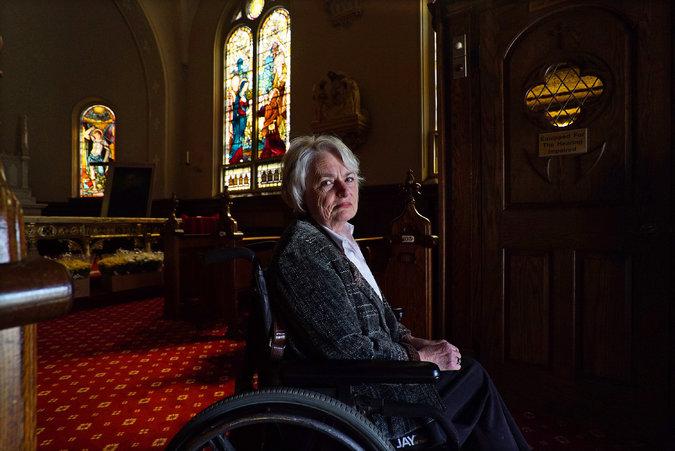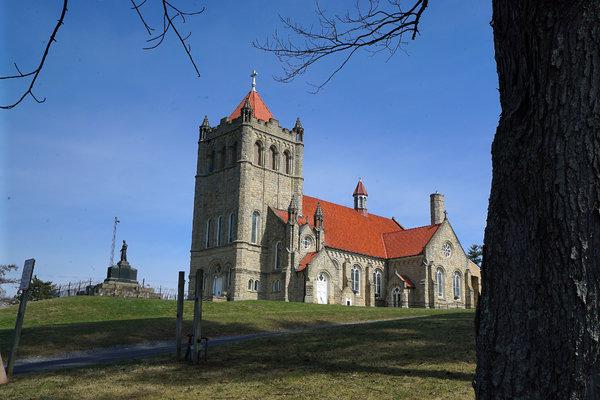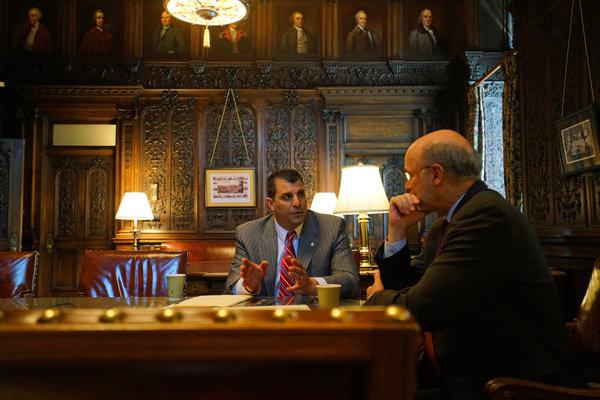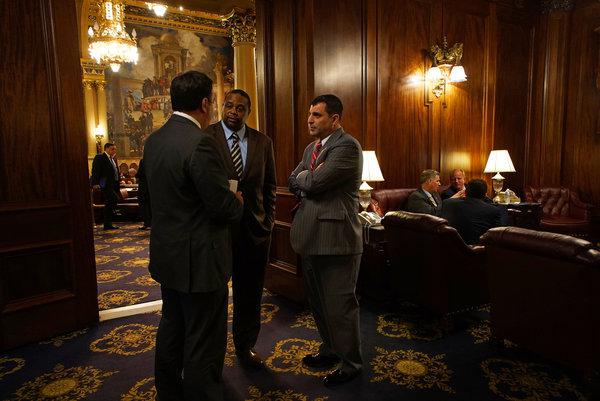|
As Pennsylvania Confronts Clergy Sex Abuse, Victims and Lawmakers Act
By Laurie Goodstein
New York Times
April 4, 2016
http://www.nytimes.com/2016/04/05/us/pennsylvania-clergy-sex-abuse.html
 |
Maureen Powers said she was sexually abused by a priest as a child in Loretto, Pa.
Photo by Nicole Bengiveno |
 |
As a child, Ms. Powers played the organ at St. Michael the Archangel in Loretto and volunteered in the parish office. When she told other priests she had been sexually abused, she says, one tried to take advantage of her sexually, another suggested she comfort herself with a daily candy bar and a third told her to see a counselor.
Photo by Nicole Bengiveno |
 |
State Representative Mark Rozzi, left, a Democrat from Berks County who is leading the charge to lift the statute of limitations on child sexual abuse, met with Gov. Tom Wolf last month to seek support.
Photo by Nicole Bengiveno |
 |
Mr. Rozzi with State Representatives Frank Burns, left, and Edward C. Gainey.
Photo by Nicole Bengiveno |
LORETTO, Pa. — By the age of 12, Maureen Powers, the daughter of a professor at the local Roman Catholic university, played the organ in the magnificent hilltop Catholic basilica here and volunteered in the parish office. But she said she was hiding a secret: Her priest sexually abused her for two years, telling her it was for the purpose of “research.”
By her high school years, she felt so tied up in knots of betrayal and shame that she confided in a succession of priests. She said the first tried to take advantage of her sexually, the second suggested she comfort herself with a daily candy bar and the third told her to see a counselor. None of them reported the abuse to the authorities or mentioned that she could take that step.
So when a Pennsylvania grand jury revealed in a report in March that the Diocese of Altoona-Johnstown, which includes Loretto, engaged in an extensive cover-up of as many as 50 abusers, Ms. Powers, now 67, decided to finally report her case. She called the office of the Pennsylvania attorney general and recounted her story, including the name of her abuser, a prominent monsignor who was not listed in the grand jury report.
“I just felt like now, someone will believe me,” said Ms. Powers, who retired after 30 years in leadership positions at the Y.W.C.A. in Lancaster, Pa.
She was not alone. Ms. Powers was among more than 250 abuse survivors and tipsters who called a hotline set up by the Pennsylvania attorney general, Kathleen G. Kane. Twenty agents were needed to answer the phones, and a voice mailbox was set up to handle the overflow.
Nearly 15 years after Boston suffered through a clergy abuse scandal dramatized in the recent movie “Spotlight,” Pennsylvania is going through its own painful reckoning. From the State Capitol in Harrisburg to kitchens in railroad towns, people say they have been stunned to read evidence that priests they knew as pastors, teachers and confessors were secretly violating children — findings the grand jury report called “staggering and sobering.” Victims are coming forward for the first time to family and friends, and alumni of parochial schools are pulling out their yearbooks, marveling at how smiling faces hid such pain.
Multiplying the outrage, the grand jury report supplied evidence that the police, district attorneys and judges in the Altoona and Johnstown area colluded with bishops in the cover-up, quashing the pleas of parents who tried to blow the whistle on priests who sexually abused children. Some of those officials are named in the report, and some still hold public office.
“It really hit home for me when I realized that these victims are my friends, my classmates,” said State Representative Frank Burns, a Democrat, whose district includes part of Johnstown and who attended Bishop McCort High School, where the grand jury found that the abuse was rampant. “Our region is devastated by drugs, suicide, alcoholism, and then you wonder — is this abuse tied into all of this?”
Bishop Mark L. Bartchak of Altoona-Johnstown, who cooperated with the grand jury’s investigation but did not see the report until it was released, tried to control the damage. He urged victims to call the attorney general’s hotline.
Bishop Bartchak declined an interview. But he said in a letter to his diocese last month: “There is no mistaking that what has been made public this past week is filled with the darkness of sin,” the bishop said. “We will pass through this darkness.”
In Altoona’s massive cathedral, its dome looming over the nearby churches of other denominations, Bishop Bartchak ordered the removal of all banners and portraits honoring all the diocese’s bishops. His two most recent predecessors were depicted in the grand jury report as deeply culpable in having allowed known abusers to continue having access to children. Bishop Bartchak removed five accused priests from ministry in the last year, while the grand jury was investigating, said Tony DeGol, the secretary for communications.
Nevertheless, there is suddenly new momentum in the state capital for calls of full disclosure and accountability. State Representative Mike Vereb, a Republican and a former police officer from Philadelphia, wrote a letter recently to the United States attorney for the Western District of Pennsylvania calling for an investigation under the federal Racketeer Influenced and Corrupt Organizations Act, known as RICO.
“This failure was colossal. It was nothing less than organized crime,” Mr. Vereb said in an interview in his office, where he keeps his old nightstick on his desk. “There was no chance, if you were a victim, that you were going to get justice.”
A flurry of negotiating has begun over bills that had been stalled for years to extend the statute of limitations for both civil and criminal cases of child sexual abuse. Abuse victims and their advocates have long argued that just as there is no statute of limitations on murder, there should be none on the sexual abuse of children.
The legislator leading the charge to extend the statute of limitations is State Representative Mark Rozzi, a Democrat from Berks County. Still boyish at age 44, he is haunted by memories of being raped by a priest in middle school — a priest he later learned went on to sexually abuse some of his friends. He said he decided to run for office in 2013 after the second of those friends committed suicide. On Good Friday a year ago, a third friend also took his own life.
“If I had spoken up when I was 13 or 14, I probably could have saved a lot of my friends. I feel a lot of guilt,” Mr. Rozzi said. “I came here to do this.”
He did not speak about his abuse until he was 39, and since then he has not stopped. He ran for office campaigning to change the statute of limitations, which impose deadlines on when victims can bring civil suits or prosecutors can press charges. Victims of child sexual abuse in Pennsylvania can file civil suits until they turn 30, and criminal cases until they are 50.
But Mr. Rozzi says that it can take even longer than that for abuse victims to come forward. Shame, confusion, fear and denial are all factors that can inhibit them from speaking out, so Mr. Rozzi and his allies are pushing for several bills to address this problem: One bill, scheduled for a vote in the House Judiciary Committee on Tuesday, would remove all time limits for filing civil or criminal suits relating to child sexual abuse — but this would apply only to people abused after the law is passed. Mr. Rozzi also wants to pass a temporary “window” in which adults victimized years ago could file suits no matter how long ago the abuse was. Other states have already passed similar window laws, including California, Delaware, Georgia, Hawaii and Minnesota.
But these window laws can leave the church and other institutions open to legions of suits. Lobbyists with the Pennsylvania Catholic Conference and the insurance industry have pressed lawmakers to hold the line, and they were working the Capitol’s corridors last week.
Amy B. Hill, a spokeswoman for the Pennsylvania Catholic Conference, argued against any changes in the statute of limitations, saying, “Over time witnesses’ memories become unreliable, evidence is lost or never found, and in many instances perpetrators or witnesses may be deceased.”
However, Pennsylvanians and their legislators say they are asking themselves why their state has been in national headlines so often over sexual abuse, and not just in the church. The state has seen the conviction of a former Penn State assistant football coach, Jerry Sandusky, for sexually abusing boys; two grand jury reports on child sexual abuse in the Archdiocese of Philadelphia; the first-ever conviction of a high-ranking Catholic official — Msgr. William J. Lynn — for covering up child abuse; and now, the prosecution of the comedian Bill Cosby on charges that he drugged and sexually abused a woman who worked at his alma mater, Temple University.
Despite all of that, it was not until the recent grand jury report, and the attorney general’s subsequent indictment of three superiors of a Franciscan order in Hollidaysburg, Pa., on charges of covering up child abuse, that legislators who were siding with the church began to rethink their positions.
“Enough is enough,” said State Representative Thomas R. Caltagirone, a Democrat from Berks County, after reading the grand jury report, which he called “revolting.”
For years, in his position as minority chairman of the Judiciary Committee, Mr. Caltagirone helped to block legislation to extend the statute of limitations, but he said in an interview that he now favored it: “We were promised that changes would be made from the top down. Then, dear God, we learn this. I have had it up to here.”
The Pennsylvania attorney general said that her work was far from finished, and that she was looking into allegations in another diocese. In Harrisburg, the deputy attorney general who led the investigation of the Diocese of Altoona-Johnstown, Daniel J. Dye, recently sat in front of a four-inch stack of papers. It was the notes taken by agents from all those hotline calls. Ms. Powers’s interview was among them.
“We’re not just here to take some information and drop it in a file,” Mr. Dye said. “If anything in this stack provides information to bring charges, we’ll do that.”
|



